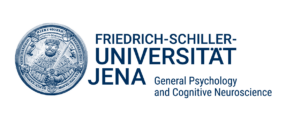Dr. Laura Sperl
Lecturer & Research Staff
Lecturer at FernUniversität Hagen and associated Post-Doc at Friedrich Schiller University Jena
Email: laura.sperl [at] uni-jena.de
Address: Jentower, Leutragraben 1, Room 18N06
Research
Research Interests:
- Time Perception
- The Multilingual Mind
- Motor Skill Change & Automatization
- Inhibition & Intererence
- Cognition, Language & Motor Performance
Research Projects:
- Dissertation/PhD thesis: Challenges in motor skill change – unraveling behavioral, cognitive and electrophysiological correlates of proactive interference
- Electrophysiological correlates of motor restrictions as a potential tool for interference control in motor tasks
- The effect of slow motion replay on time perception
- On the architecture of the multilingual mental lexicon in late multilinguals
Publications
Articles (peer-reviewed):
- Dietrich, A., Liepelt, R. & Sperl, L. (2024). Die Wissenschaftsautor*innen Ihres Vertrauens – Über die Hürden von Wissenschaftskommunikation. Das In-Mind Magazin, 2. https://de.in-mind.org/article/die-wissenschaftsautorinnen-ihres-vertrauens-ueber-die-huerden-von
- Sperl, L.; Nicanço Tomé, M. S., Kühn, H., Kreysa, H. (2024). Context Matters: How Experimental Language and Language Environment Affect Mental Representations in Multilingualism. Languages 9(3), 106. https://doi.org/10.3390/languages9030106
- Sperl, L., Schroeger, A., Kaufmann, J. M., & Kreysa, H. (2024). Mental representation of words and concepts in late multilingualism: A replication and extension of the Revised Hierarchical Model. The Mental Lexicon, 1–42. https://doi.org/10.1075/ml.23018.spe
- Sperl, L.*, Breier, C. M.*, Grießbach, E. & Schweinberger, S. R. (2023). Do typing skills matter? Investigating university students’ typing speed and performance in online exams. Higher Education Research & Development. https://doi.org/10.1080/07294360.2023.2287724 ; *shared first authorship
- Hüttner, N.*, Sperl, L.*, & Schroeger, A. (2023). Slow motion bias: Exploring the relation between time overestimation and increased perceived intentionality. Perception, 030100662211399. https://doi.org/10.1177/03010066221139943; *shared first authorship
- Sperl, L., Ruttloff, J. M., Ambrus, G. G., Kaufmann, J. M., Cañal-Bruland, R. & Schweinberger, S. R. (2021). Effects of motor restrictions on preparatory brain activity. Experimental Brain Research, 239(11), 3189–3203. https://doi.org/10.1007/s00221-021-06190-w
- Sperl, L., Ambrus, G. G., Kaufmann, J. M., Schweinberger, S. R. & Cañal-Bruland, R. (2021). Electrophysiological correlates underlying interference control. Biological Psychology, 163, 108138. https://doi.org/10.1016/j.biopsycho.2021.108138
- Sperl, L., Gergeleit, T. & Cañal-Bruland, R. (2021). On the role of different subdimensions of inhibition for successful motor skill change. Human Movement Science, 77, 102801. https://doi.org/10.1016/j.humov.2021.102801
- Sperl, L., Hüttner, N. & Schroeger, A. (2021). Why do actions in slow motion videos appear to last longer? On the effect of misconceiving video speed. Perception, 50(1), 69-79. https://doi.org/10.1177%2F0301006620982212
- Sperl, L., & Cañal-Bruland, R. (2020). Interindividual differences in the capability to change automatized movement patterns. Acta Psychologica, 204, 103027. https://doi.org/10.1016/j.actpsy.2020.103027
- Sperl, L. & Cañal-Bruland, R. (2020). Reducing proactive interference in motor tasks. Journal of Motor Behavior, 52, 372-381. https://doi.org/10.1080/00222895.2019.1635984
Book Chapters:
- Sperl, L. & Cañal-Bruland, R. (2020). Changing automatized movement patterns. In N. J. Hodges & A. M. Williams (Eds.), Skill Acquisition in Sport: Research, Theory and Practice (3rd edition) (pp. 20-38). London: Routledge.
Other Publications:
- Sperl, L. (2020). Zur Rolle von proaktiver Interferenz bei motorischen Umstellungsaufgaben. Jenaer Beiträge zum Sport, 23,
- Sperl, L. (2018). Die Macht der Gewohnheit – Herausforderungen beim motorischen Umlernen. Jenaer Beiträge zum Sport, 22, 18-20.
- Sperl, L. (2017). Directed Forgetting – Ein Schlüssel zum erfolgreichen motorischen Umlernen? Zeitschrift für Sportpsychologie, 24(4), 168.
Academic Vita
- since 2022: Lecturer, Department for General Psychology, FernUniversität Hagen, Germany
- since 2022: Associated Post-Doc and Lecturer, Department for General Psychology, Friedrich Schiller University Jena, Germany
- 2020 – 2021: Post-Doctoral Researcher/Scholarship Holder, Department for General Psychology, Institute of Psychology, Friedrich Schiller University Jena, Germany
- since 2017: Research Staff and doctoral candidate, Department for the Psychology of Human Movement and Sport, Institute of Sport Science, Friedrich Schiller University Jena, Germany
- 2013 – 2016: Master of Science in Cognitive Psychology and Neurosciences, Friedrich-Schiller-University Jena, Germany
Master’s thesis topic: Mental representation of multilingualism. - 2015 – 2016: Research Assistant, Department of Personality Psychology and Psychological Diagnostics, Friedrich-Schiller-University Jena, Germany
- 2014 – 2015: Università degli Studi di Padova, Italy
- 2010 – 2013: Bachelor of Science in Psychology, Friedrich-Schiller-University Jena, Germany
Bachelor’s thesis topic: Neuronal correlates of hypnosis. An investigation of the dynamic complexity of the human EEG
Further activities
Reviewer for scientific peer-reviewed journals:
- Human Movement Science
- Journal of Experimental Psychology: Human Perception and Performance
- Frontiers in Human Neuroscience
- Cognitive Processing
Teaching
- Full position as lecturer at FernUniversität Hagen
- Empirical-experimental internships for psychology students
- Supervision of Bachelor’s and Master‘s theses
- Seminars for psychology students
- Supervision of students’ theses at Friedrich-Schiller-Universität Jena
- Previous courses:
- Empra Psychology (empirical internship)
- Time Perception
- The Multilingual Brain
- Selected Aspects of Sport Psychology
- Cognitive Aspects of Sports Performance








